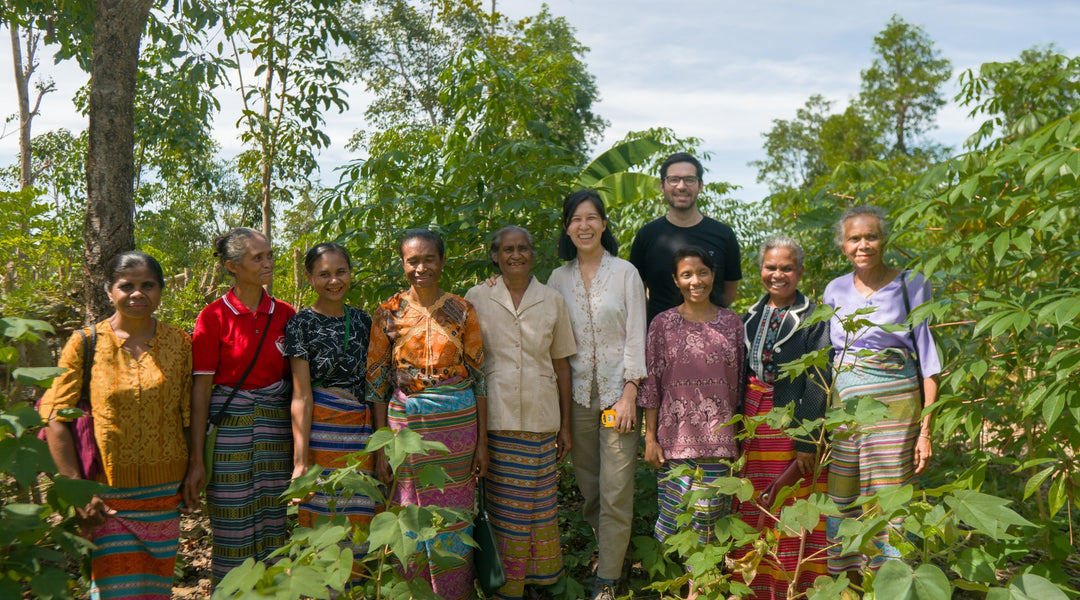Sukkha Citta, an Indonesian fashion label founded by development economist Denica Riadini-Flesch, is pioneering a “farm to closet” model that brings full transparency to clothing production.
Each garment can be traced to the farm where it was grown and to the artisan who crafted it.
The brand emerged in 2016 after Riadini-Flesch’s return to Indonesia. Her work at the World Bank revealed the limitations of traditional aid.
“I started understanding the incredible impact that you can have on other people’s lives when you simply create opportunities that weren’t there before,” she says.
In rural Indonesia, only 2% of female cotton farmers earn a living wage. Environmental damage has also been severe, West Java’s Citarum river is one of the world’s most polluted, largely due to textile dyes.
“These women unknowingly use chemicals that are banned in most developed countries, dumping it into the rivers where their children play in,” Riadini-Flesch says.
Regenerative Farming Restores Land and Livelihoods
Facing a personal health crisis, Riadini-Flesch sought deeper purpose. She began working with smallholder farmers to adopt indigenous, regenerative farming techniques, encouraging them to recall ancestral practices.
One farmer donated a hectare of land, planting cotton alongside corn, chili, and mung beans.
“The corn is what they call the protective crop. The chillies are a trap crop. And the mung bean is actually a nitrogen fixer,” she explains.
The impact was transformative. “Within three years, the yield increased six times.”
Natural Dyes and Traditional Techniques Revive Rural Craft
Sukkha Citta’s artisans dye textiles using plants like locally grown indigo. “That’s the unique thing with Sukkha Citta. It’s 100 percent farm to closet,” says Riadini-Flesch.
So far, their process has regenerated more than 60 hectares of land and prevented over 5 million litres of dye pollution.
Each item, whether menswear, womenswear, or unisex—takes around 180 days to make and involves 12 families.
“This way of doing things empowers women, increases their livelihoods, restores soil health, and sequesters excess carbon,” she says.
Building Education and a Sustainable Fashion Blueprint
The company reinvests its profits into communities, establishing village craft schools to pass on traditional knowledge.
“It’s a place where we are repairing the broken lineage of craft,” says Riadini-Flesch.
In 2023, she received a Rolex Award for Sukkha Citta’s work in regenerative agriculture and sustainable fashion.
The funding is supporting expansion and digital tools. “The Rolex Award is helping us build an app that digitizes our curriculum, that allows us to train farmers in regenerative farming without me being there.”
Designing for Longevity, Not Seasons
Sukkha Citta designs clothing that adapts to life, not trends. “Like our dresses, they all have pockets, and are field tested to fit multiple body types. Women’s bodies change,” Riadini-Flesch says.
The brand avoids seasonal lines and overproduction, mirroring the rhythm of local agriculture.
“In rainy season, we tend to only work with really blue colors, because that’s when the Indigo is in harvest.”
Customers often find the clothes spark personal reflection. “It makes them think about purpose. It makes them think about being part of something bigger,” she says.
By 2030, Sukkha Citta aims to reach 10,000 people and regenerate 1,000 hectares of land. “The bigger the business grows, the more people we can lift up.”
PHOTO: SUKKHA CITTA
This article was created with AI assistance.
Read More






 Thursday, 05-02-26
Thursday, 05-02-26







